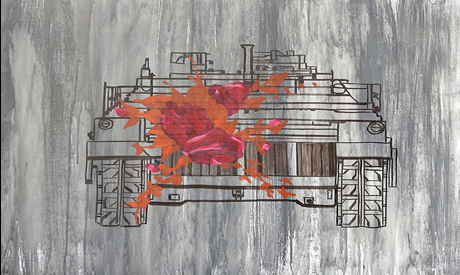
The Couch by Eman Abdou. Courtesy of 6 Contemporary Arts
The couch in the traditional Egyptian home is a sacred place; it is a site for familial bonding and relaxation. Most of all, it is a place of discussion and deliberation. At 6 Contemporary Arts (previously The Gallery), Eman Abdou explores the relationships between citizens and the political environment in which they (passively) exist in a series of highly ironic paintings, sometimes bright and sometimes monochromatic; each boasting a different mood and a different story.
The Cairo-based visual artist worked with prominent curator Aida El-Torie to prepare Domestic Relations: The Couch, which opened 15 October. Abdou tells Ahram Online, "The exhibition’s title refers to the political relations that we usually don’t know anything about."
In The Couch, household object swiftly become the platform on which private conversations encounter news of public happenings. Further, Abdou investigates the relations that play out between domesticities and politics through painting flower motifs, borrowed from patterns that appear on old folkloric Egyptian couches on top of army tanks, and placing tanks and soldiers on the fabrics of bright sofas. There’s a strong sense of irony running through the collection.
The artist echoes the recurring sentiments of the Egyptian public. Both were often dazed and confused after violent breakouts in the aftermath of the revolution. Abdou reminisces about talking to friends after events such as Maspero (where a Coptic protest took place and was then attacked by security), speculating over alliances and attempting to read into events.
The soft-spoken Eman Abdou says the recurring couch in her collection "represents the inactive mass of people, and at the same time, it reflects how political events were domesticated and the media violated our personal space."
Abdou presents a number of painted variations to tackle the idea of the fickle relationship between domestic life and political dynamics; in one painting, a bright orange couch is decorated with bright pink flowers, as silhouettes of citizens line up across the fabric. In another, a heavily contoured army tank stands defiantly across a grey background, with red and orange roses breaking the monochrome and bursting from the vehicle.
The artist does not stick to one narrative only; as you stroll through the gallery you are faced with a number of scenarios with the couch and the tank as alternating focus points. "I don’t want to state a fact," Abdou says. "I’m trying to evoke critical questions."
Through aesthetic irony the artist set out to show how private and public lives fused in the months that followed the people’s uprising of 2011. The resulting collection is visually intriguing; the juxtaposition of the tank as a military symbol with the flowery couch as an emblem of domestic Egyptian life stirs the mind. And Abdou’s painting skills are unquestionable.
Yet at times, the paintings appear slightly flat. In a way, looking at the canvases, the observer feels like they are sitting (or rather standing) on their own couch and Abdou’s painting is the TV screen - on pause. The two-dimensional nature of the pieces renders the observer – you - as helpless as the citizens on the couch. Isn’t that ironic?
Eman Abdou delves in video and photography, although painting is her forte. She teaches painting at the Faculty of Fine Arts, Helwan University, while pursuing her PHD, which will analyse political art in Egypt in the past 20 years.
Programme:
Now open, until 11 November.
6 Contemporary Arts, 6 Salah Eddin St. Zamalek, Cairo
Short link: